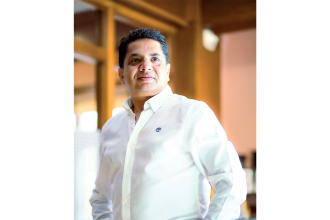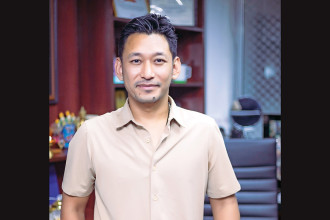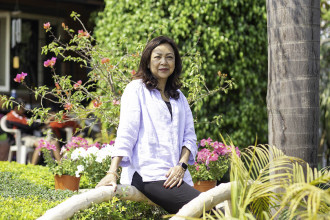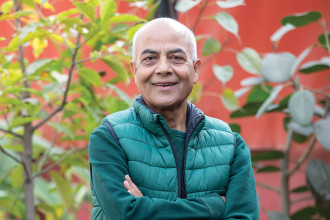-1730187732.jpg)
“I would like to be remembered as a scholar of international relations from Nepal. In our country, there are very few experts in this field, and internationally, Nepal doesn't receive much attention or importance in global politics. My hope is to be remembered as someone who changed that narrative, as someone who brought Nepal onto the global stage and gave it a voice in international relations”
Dr Pramod Jaiswal is the Research Director at Nepal Institute for International Cooperation and Engagement (NIICE) where he plays a pivotal role in enhancing Nepal’s presence in the global discourse of international relations. He holds a Master’s, MPhil and PhD from the School of International Studies at Jawaharlal Nehru University, New Delhi. As a recipient of the Silver Jubilee Scholarship and the SAARC Doctoral Fellowship from the Indian Council for Cultural Relations, Government of India, Jaiswal demonstrates a strong commitment to academic excellence. Dr Jaiswal’s diverse background in teaching, journalism and research allows him to approach complex issues with a multifaceted perspective.
He has authored, edited and co-edited two dozen books on China and South Asian affairs, enriching academic discourse and providing valuable insights into the region. Through his work, he aims to inspire future generations of scholars and leaders in Nepal while promoting the country on the international stage.
In this edition of Business 360, Dr Jaiswal shares the five things that have impacted his life and work.
Passion for reading
As a child, I had a unique upbringing. Coming from Madhesh to Kathmandu was an adjustment, especially with language barrier but it deeply shaped my views on identity, rights and federalism. I grew up as the only son, with three sisters, and I must admit I was a pampered child. I hated studying except for math which I enjoyed solving while listening to music. Ironically, the very literature I disliked as a child became a key part of my life. Now, I am in a profession where reading is essential and I find myself reading 20 to 30 pages daily, something my younger self would have never imagined. My passion for reading has become my source of income and I wouldn’t have it any other way. The boy who wanted to be a doctor or a lawyer found a new dream, one that is equally fulfilling and impactful, and I am proud of that journey.
Choosing academia over politics
When I passed my SLC, I had dreams of studying law and eventually entering politics to serve my country. At that time, my father was involved in the election process, and I was deeply inspired by political figures like Dr Baburam Bhattarai. Nepal was in the midst of a people’s movement, and there was a lot of hope and expectations, particularly surrounding Dr Bhattarai. He had a strong academic background and when he became the prime minister, many of us believed that significant change was on the horizon. However, those expectations quickly faded. Dr Bhattarai eventually resigned, claiming that no one was allowed to work effectively in the country. For many of us, it was a moment of profound disappointment. We questioned how someone with his education and experience, who had spent years in the movement, could fail to deliver on the promises. If he couldn’t bring about change, who could?
That moment was a turning point for me. I realised that politics was not my calling. Despite my prior involvement in political activities, especially during my time in India, I made the decision to step away from active politics. I had been deeply involved welcoming political leaders like Pushpa Kamal Dahal ‘Prachanda’ when he visited India as the prime minister, meeting various leaders like Sher Bahadur Deuba and Madhav Kumar Nepal. But after Dr Bhattarai’s resignation, I knew my future lay elsewhere.
I shifted my focus to academics and it is a decision I have never regretted. Academia has allowed me to pursue meaningful work in a different way and I believe it was the best choice I could have made for myself and my career.
Turning a crisis into an opportunity
There have been many moments that tested my leadership but one that stands out was during Covid 19 when we were struggling with resources at NIICE. We had started gaining visibility in 2019 after some successful events, but then the pandemic hit, and suddenly, the world was drained of resources. It felt like everything we had built was slipping away. There was a scarcity of engagement, collaborations and financial support, and I had just started the think tank in 2016. When the Covid pandemic hit, we were still trying to expand.
However, rather than seeing this as a setback, we turned the challenge into an opportunity. We shifted to the virtual platform, leveraging the digital space to connect with renowned speakers and international relations experts from around the world. We even managed to host Noam Chomsky virtually, something we couldn’t have done even with substantial resources. Chomsky, along with many other top theorists in the field of international relations, participated in our virtual sessions. Out of the top ten international relations theorists, we hosted seven, all thanks to the accessibility of the virtual world.
Despite the lack of in-person opportunities, we became a global platform for discourse. We held global conferences that brought together 220 highly reputed individuals, a Young Scholars conference that connected over 300 scholars, and a Women’s Summit to spotlight female scholars in international relations. Many claimed that there weren’t enough women experts in this field but we proved them wrong by showcasing the vast talent out there.
Covid tested us but it also gave us the chance to grow. I was working 18-hour days during this time, and through sheer persistence, we hosted thousands of people virtually over the course of a year. It was a tough time, but in the end, it became the defining period for NIICE’s expansion.
Persistence is key
For me, success is simply achieving what you set out to do. I had a dream of establishing a think tank in Nepal, and I made it a reality. Success isn’t just about wealth or recognition; it’s about fulfilling your goals and staying true to your passion. One of the best pieces of advice I received was from my father, who told me never to chase after money but to follow what I love. That philosophy has stayed with me, especially during tough times when there was no immediate financial gain from my work. Persistence is key and through hard work, I have built something that connects Nepal to the world, something I am truly proud of.
Changing the narrative
I would like to be remembered as a scholar of international relations from Nepal. In our country, there are very few experts in this field, and internationally, Nepal doesn’t receive much attention or importance in global politics. My hope is to be remembered as someone who changed that narrative, as someone who brought Nepal onto the global stage and gave it a voice in international relations.
Additionally, I want to be remembered for the contributions I have made through my writing. With around 20 books whether edited, co-edited or authored I hope my work in international affairs continues to impact and inspire long after I am gone.






